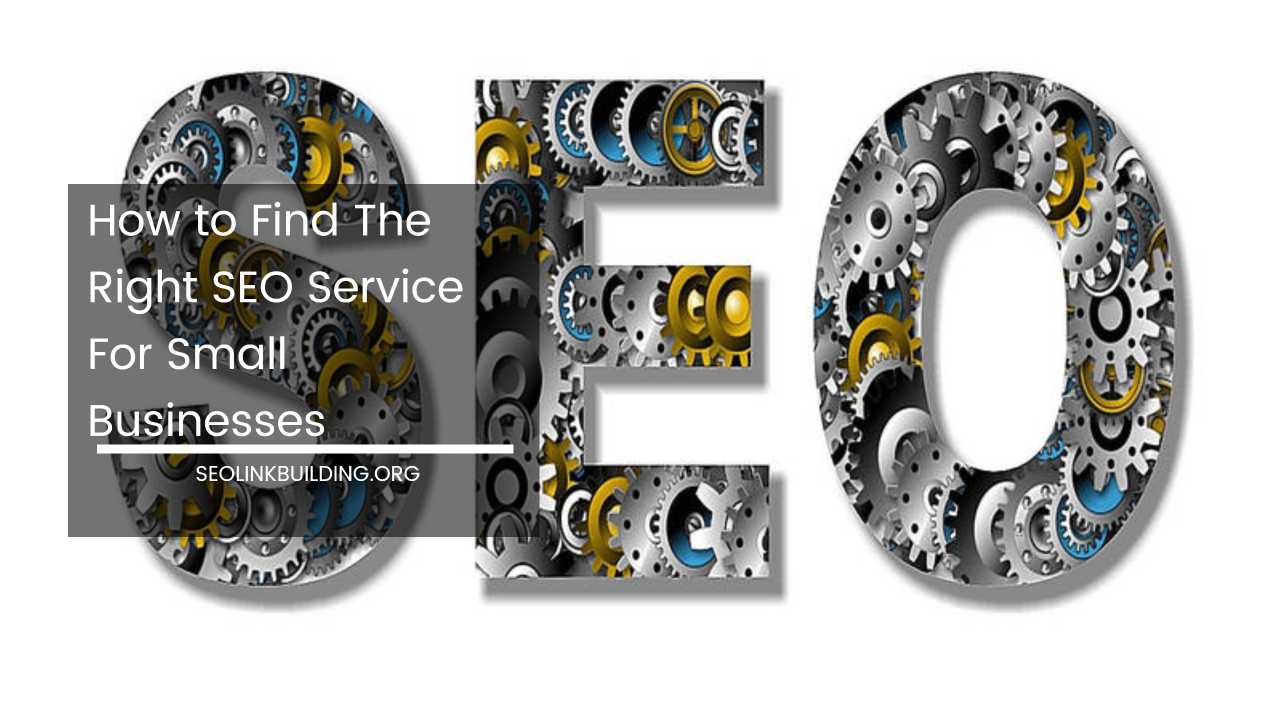How to Find the Right SEO Service for Small Businesses

How to Find The Right SEO Service For Small Businesses: A Comprehensive Guide
In today’s digital age, a robust online presence is no longer a luxury for small businesses; it’s a necessity. Search Engine Optimization (SEO) serves as the cornerstone for establishing that presence, driving organic traffic to your website, and propelling you ahead of the competition.
However, with a vast and ever-evolving SEO service landscape, selecting the ideal partner can feel like navigating a labyrinth.
This comprehensive guide empowers you, the small business owner, to confidently navigate the world of SEO services and make an informed decision.
Understanding Your Needs: Charting Your Course to Success
Before embarking on your SEO service quest, a clear understanding of your specific needs is paramount. Consider these key questions to chart your course:
- Business Goals: What are your aspirations for SEO? Are you aiming for increased brand awareness, generating qualified leads, or boosting online sales? Clearly defined goals will guide your SEO strategy and help you identify the right service provider.
- Target Audience: Who are you striving to reach? Understanding their demographics, online behavior, and search queries is crucial. Conduct market research and leverage audience insights from social media analytics to create a detailed buyer persona.
- Current Website Health: Take stock of your website’s technical SEO aspects (e.g., page loading speed, mobile responsiveness), content quality, and existing ranking for relevant keywords. Utilize free SEO audit tools like Google Search Console or SEMrush to gain valuable insights into areas for improvement.
- Budget: SEO costs can vary significantly. Determine a realistic investment range that aligns with your financial resources. Remember, SEO is an ongoing process, so factor in long-term costs when considering service packages.
The SEO Service Landscape: A Diverse Ecosystem
With a roadmap of your needs in hand, let’s explore the diverse range of SEO services available:
- Freelance SEO Specialists: Freelancers offer a cost-effective option, particularly for small businesses with limited budgets. However, meticulously vetting their experience and expertise through platforms like Upwork or Fiverr is essential. Look for freelancers who specialize in your industry and have a proven track record of success.
- Small SEO Agencies: These agencies cater specifically to small businesses, offering a personalized touch and a more affordable service tier compared to larger agencies. Look for agencies with experience in your industry niche and a focus on white-hat SEO techniques.
- Large SEO Agencies: These agencies boast a wider range of services and expertise, often employing dedicated teams for various SEO disciplines. However, their services come with a higher price tag. Ensure they can dedicate adequate resources to your specific needs and avoid getting lost in the shuffle of larger clientele.
- In-House SEO Teams: Building an in-house team grants you the most control over your SEO strategy. However, this approach requires hiring skilled SEO professionals, which can be a significant financial investment, especially for smaller businesses. Consider the long-term cost-benefit analysis before opting for this route.
Choosing the Right Partner: Unveiling the Perfect Match
Once you’ve identified potential service providers, delve deeper with these crucial evaluation criteria:
- Experience and Expertise: Look for a company with a proven track record of success in your industry. Research their past projects, client testimonials, and industry awards to assess their capabilities.
- SEO Process and Methodology: How will they approach your SEO strategy? Do they prioritize white-hat techniques that adhere to Google’s ever-evolving guidelines? Ask for a detailed breakdown of their SEO process, including on-page optimization strategies, content creation plans, and off-page link-building tactics.
- Communication and Transparency: Regular communication is vital for a successful SEO partnership. Ensure the service provider offers clear communication channels, provides regular reports on progress and SEO results, and is readily available to address your questions and concerns.
- Pricing and Contracts: Transparency in pricing structures is key. Compare quotes from various providers and ensure their pricing aligns with your budget and the scope of services offered. Review contracts thoroughly, paying close attention to service inclusions, terms of service, and termination clauses. Don’t hesitate to negotiate terms that are favorable to your business needs.
Beyond the Basics: Red Flags to Avoid
Unethical SEO practices can not only hinder your website’s ranking but also incur penalties from search engines. Here are some red flags to be on the lookout for:
- Guaranteed Rankings: SEO is an ongoing process, and rankings can fluctuate based on various factors. Guaranteed top rankings are unrealistic and often achieved through black-hat techniques that can ultimately harm your website.
- Focus on Quantity Over Quality: A good SEO strategy emphasizes high-quality, informative content that resonates with your target audience, not just keyword stuffing. Beware of service providers who promise to generate mountains of content with little emphasis on originality or user value.
- Lack of Transparency: If an SEO service provider is vague about their strategies, hesitant to share results, or avoids answering your questions directly, it’s a clear red flag. Look for a partner who embraces transparency and fosters open communication.
The Power of Client Testimonials and Case Studies
Positive client testimonials and case studies can offer valuable insights into an SEO service provider’s capabilities. Look for testimonials from businesses similar to yours that achieved success through the agency’s SEO efforts.
Case studies should showcase successful SEO campaigns in your industry, detailing the strategies employed and the results achieved.
Don’t hesitate to request references from past clients to gain firsthand perspectives on the agency’s work ethic and communication style.
The Final Step: Schedule Consultations and Ask the Right Questions
Shortlist a few potential SEO service providers based on your evaluation criteria and schedule consultations.
This is your opportunity to delve deeper and ask in-depth questions about their approach, experience, and how they plan to tailor their services to your specific needs. Here are some key questions to consider:
- Staying Ahead of the Curve: SEO is a dynamic field, and Google’s algorithm updates can significantly impact ranking strategies. Ask how the service provider stays up-to-date with the latest SEO trends and algorithm updates to ensure your website remains competitive.
- Success Measurement: How will they measure and report on the success of your SEO efforts? Ask for specific metrics they track and how they translate those metrics into actionable insights for further optimization.
- Content Creation and Link Building: Content creation and link building are crucial aspects of any SEO strategy. Inquire about their approach to content creation, including content types, topic selection, and content optimization strategies. Similarly, delve into their link-building tactics, ensuring they prioritize white-hat techniques that build high-quality backlinks from reputable websites.
- Industry Expertise: While general SEO knowledge is important, industry-specific expertise can be invaluable. Ask if the service provider has experience working with businesses in your industry and inquire about their understanding of the unique challenges and opportunities within your niche.
- Long-Term Partnership: SEO is a long-term investment. Ask about their approach to building a long-term partnership and how they plan to adapt their strategies to your evolving business goals.
By following these steps and conducting thorough research, you’ll be well-equipped to select the right SEO service partner who can propel your small business towards greater online visibility and long-term success.
Remember, SEO is a collaborative effort. Choose a partner who fosters open communication, values your input, and demonstrates a commitment to achieving your business objectives.
Beyond the Basics: Empowering Yourself with SEO Knowledge
While partnering with an SEO service is highly beneficial, empowering yourself with basic SEO knowledge can be advantageous. Here are some tips to get you started:
- Stay Educated: There are numerous online resources available to help you understand fundamental SEO principles. Explore reputable websites like Moz, Search Engine Journal, and Backlinko for informative articles, guides, and webinars.
- Focus on Quality Content: Content is king in the SEO world. Create valuable and informative content that engages your target audience, addresses their pain points, and establishes you as an authority figure in your industry.
- Embrace White-Hat Techniques: Black-hat techniques may offer short-term gains but can ultimately harm your website’s ranking and reputation in the long run. Focus on building a strong foundation through white-hat techniques like keyword research, on-page optimization, and high-quality content creation.
- Utilize Free SEO Tools: Numerous free SEO tools can help you audit your website’s health, track keyword rankings, and identify areas for improvement. Tools like Google Search Console, Ahrefs Webmaster Tools, and SEMrush offer free tiers with valuable features.
Final Thoughts: Building a Successful SEO Strategy for Your Small Business
Finding the right SEO service partner is a crucial step in establishing a successful SEO strategy for your small business.
By clearly defining your goals, understanding your target audience, and conducting thorough research, you can confidently navigate the SEO service landscape and select a partner who aligns with your needs and budget.
Remember, SEO is a marathon, not a sprint. Patience, ongoing collaboration with your chosen SEO service provider, and a commitment to continuous learning will pave the way for achieving your online visibility goals and propelling your small business towards long-term success in the ever-evolving digital landscape.













